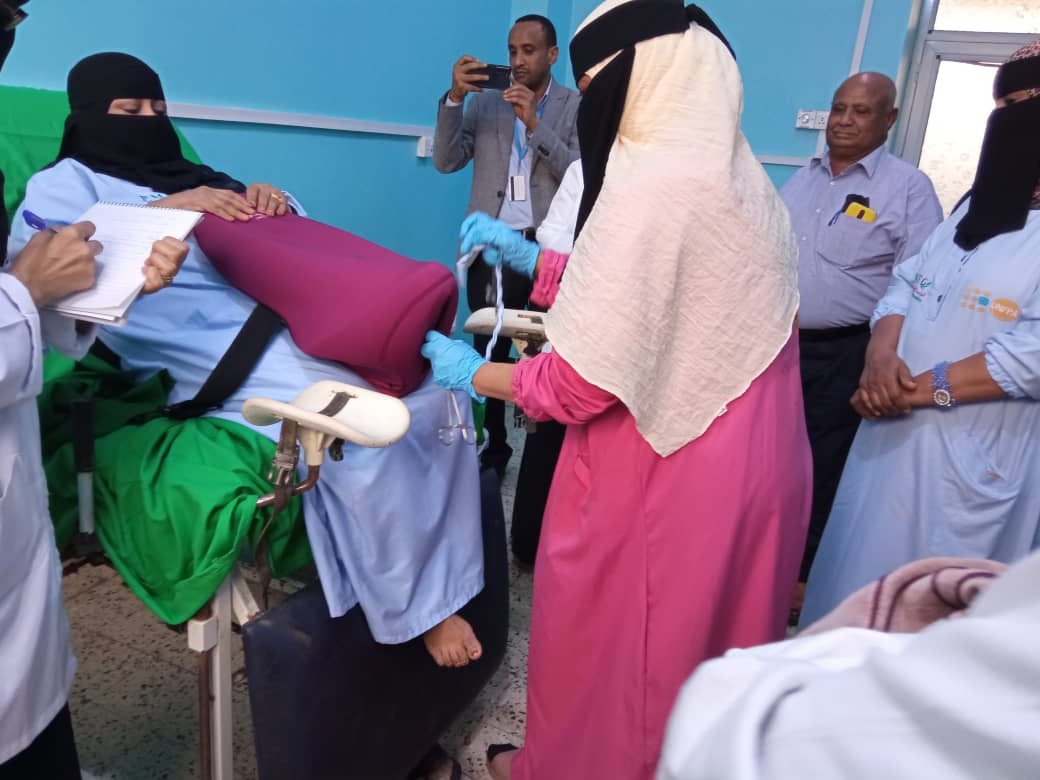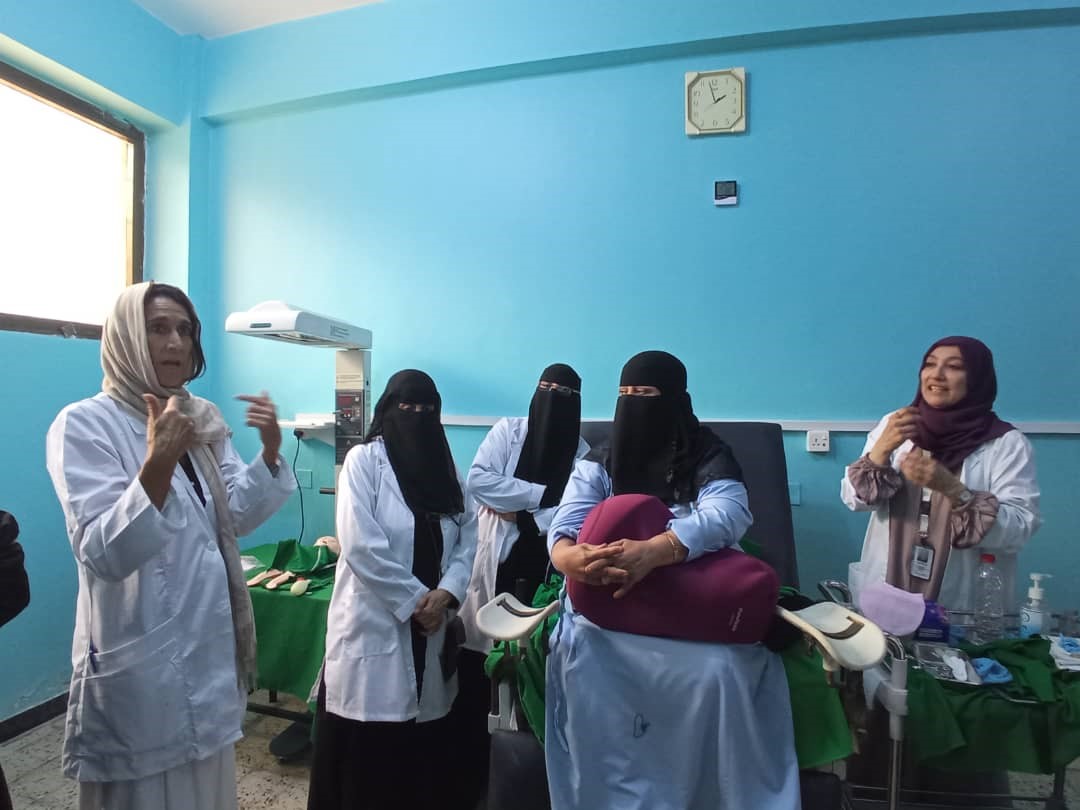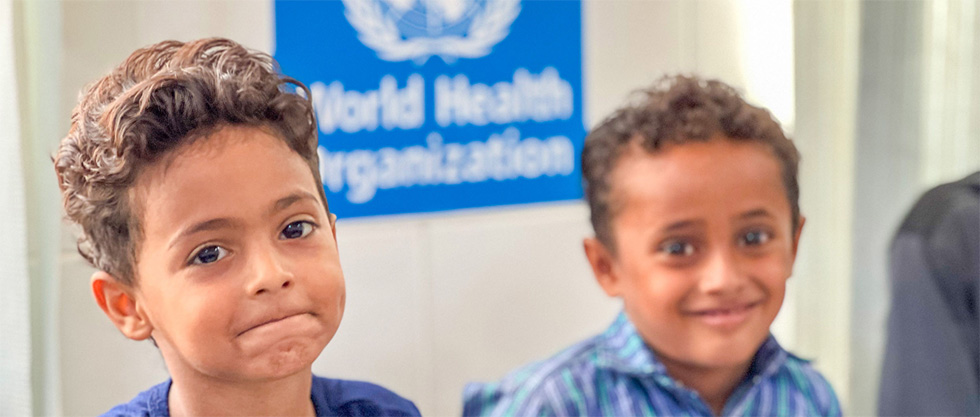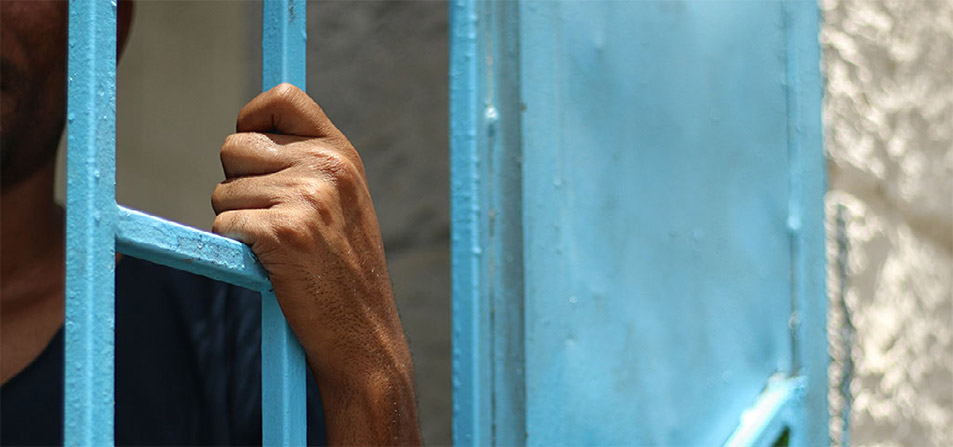Giving newborns a healthy start to life in Yemen
 31 August 2022, Aden – The first 90 minutes of a newborn’s life are a critical window to prevent sepsis, asphyxia, and other birth complications. In these first moments, there are simple, cost-effective practices that can benefit every mother and child.
31 August 2022, Aden – The first 90 minutes of a newborn’s life are a critical window to prevent sepsis, asphyxia, and other birth complications. In these first moments, there are simple, cost-effective practices that can benefit every mother and child.
The key components are to dry the baby immediately and thoroughly after birth, to do immediate skin-to-skin contact for at least 90 minutes, to clamp the cord after pulsations stop and cut the cord with a sterile instrument, and to initiate early breastfeeding.
Other key interventions include ensuring the presence of a birth companion, adopting a position of choice, providing adequate food and fluids, using evidence-based criteria for episiotomy, avoiding unnecessary practices such as fundal pressure and forced pushing, and giving oxytocin within one minute of birth.
With the support of the World Bank, WHO and the authorities in Yemen, are providing coaching to health workers to change hospital practices and improve the quality of newborn care.
Coaching in early essential newborn care has started at Al Sadaqa, the biggest referral hospital in Aden, led by 13 facilitators, who passed their skills on to another 7 staff members, as well as 6 staff from other hospitals (Al-Sha’ab, Al-Razi and Ibn Khaldoun) and governorate newborn health coordinators.
The coaching uses on-the-job methods and immediate application in the workplace, with no lectures, presentations, or reading materials. Needed supplies were also provided to the participating hospitals, including MamaNatalies, NeonNatalies, glogerm, room thermometers, and wall clocks with digital number displays for hours, minutes and seconds.
The participants’ skills and knowledge significantly improved as measured in pre-and post-test results. Before the coaching, the participants’ scores averaged 44% in a written test, 0% for the management of a breathing baby, and 30% for the management of a non-breathing baby. After the coaching, these scores increased to 81%, 96%, and 93%, respectively.
“This is a huge step forward and a starting point for positive improvements in maternal and child health in Yemen,” said the WHO Representative to Yemen Dr Adham Rashad Ismail Abdel Moneim.
 Moving forward, plans are under way to share early essential newborn care knowledge and skills with all key staff working in the labour department, including midwives, obstetricians, pediatricians and nurses from neonatal Intensive care units, between August and October 2022. WHO has also developed a detailed staff coaching plan for the participants, with supportive supervision and review of hospital registries to measure improvements in the quality of care provided to newborns and mothers.
Moving forward, plans are under way to share early essential newborn care knowledge and skills with all key staff working in the labour department, including midwives, obstetricians, pediatricians and nurses from neonatal Intensive care units, between August and October 2022. WHO has also developed a detailed staff coaching plan for the participants, with supportive supervision and review of hospital registries to measure improvements in the quality of care provided to newborns and mothers.
WHO provides timely response to flood-affected governorates in Yemen
Sana’a, 16 August 2022 – In urgent response to the needs of the communities affected by floods in Yemen, the World Health Organization (WHO) has provided emergency health and laboratory supplies, supported specialized trauma teams and joined field missions with national health authorities and other humanitarian partners.
Triggered by the heavy seasonal rains, extensive flooding has ravaged several governorates in Yemen since mid-July 2022. Tens of thousands of people have been affected so far, with more than 35 000 households impacted across 85 districts in 16 governorates, according to local authorities.
At least 77 people, including children, were killed in Al Bayda, Amran, Dhamar, Hajja, Ma’rib and Sana’a governorates. In addition, displacement sites and infrastructure – including water supply, public services, and private properties – were severely damaged.
WHO supported 4 specialized trauma teams and 6 on-duty ambulances on the ground, as well as set up 34 epidemiological early warning detection points in Ma’rib – one of the most affected governorates – where thousands of shelters for displaced families were destroyed. Additional essential emergency health supplies were also released to the rapid response and emergency medical teams in Hajjah, Al Mahaweet, and Raymah governorates.
Along with its constant monthly supply of 144 600 litres of fuel to 11 hospitals, WHO, jointly with the sub-national health cluster, had also prepared a comprehensive heavy rainfall and floods preparedness and response plan in Al Hodeidah governorate, provided the Central Public Health Laboratory with equipment, and trained 25 laboratory technicians on the microscopic diagnosis of malaria.
“The risk of water- and vector-borne diseases, including malaria, cholera and other communicable diseases is unfolding,” said Dr Adham Rashad, WHO Representative to Yemen. “With heavy rains expected to continue until the end of August 2022, we have scaled up our response to reach affected people and prevent any potential outbreak of these diseases.”
Additional cholera kits, IV fluids, rapid diagnostic tests for cholera, and supplementary modules of the interagency emergency health kit are under way. WHO continues to provide aid as the situation evolves.
For further information, please contact:
• Muneera Al-Mahdli, Emergency Communications Officer, WHO’s Regional Office for the Eastern Mediterranean,
• Kevin Cook, Communications Advisor, WHO-Yemen Office,
Protecting Yemeni children against measles and rubella

15 August 2022 - WHO together with public health authorities and partners is implementing a vaccination campaign against outbreaks of measles and rubella. The campaign aims to protect 1.35 million infants and children up to age 10, in 74 high-risk districts of 10 governorates across Southern Yemen.
Responding to Yemen's unseen mental health crisis

12 June 2022 - Mohamed (not his real name) is a 35-year-old patient at the Al Amal hospital in Sana’a – one of only four hospitals in Yemen providing care to persons with mental disorders.
Mohamed (not his real name) is a 35-year-old patient at the Al Amal hospital in Sana’a – one of only four hospitals in Yemen providing care to persons with mental disorders.
A father of four, Mohamed is isolated from his wife and children. He thinks about them constantly.
“They have nothing to eat,” he says, eyes welled with tears. “All I am worried about is my children going hungry, while I must stay here for my treatment. I miss them. They have no one to support them.”
Outside the hospital walls, Mohamed faces social stigma and shame, because of widespread misinformation, ignorance, and discriminatory attitudes about mental illness in Yemen.


